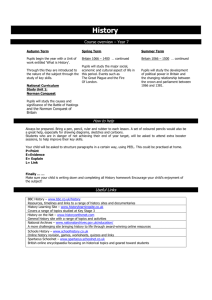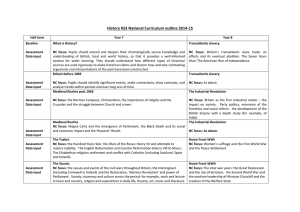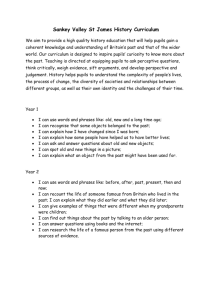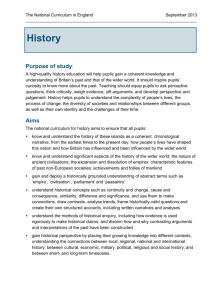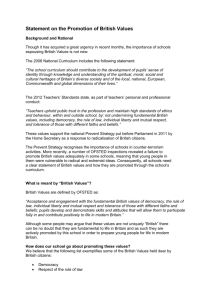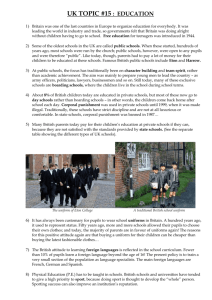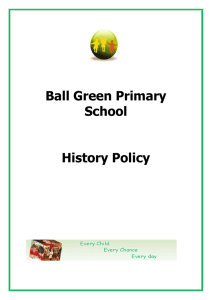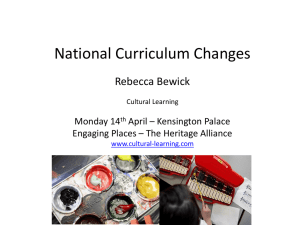History programmes of study: key stage 3 National curriculum in England
advertisement
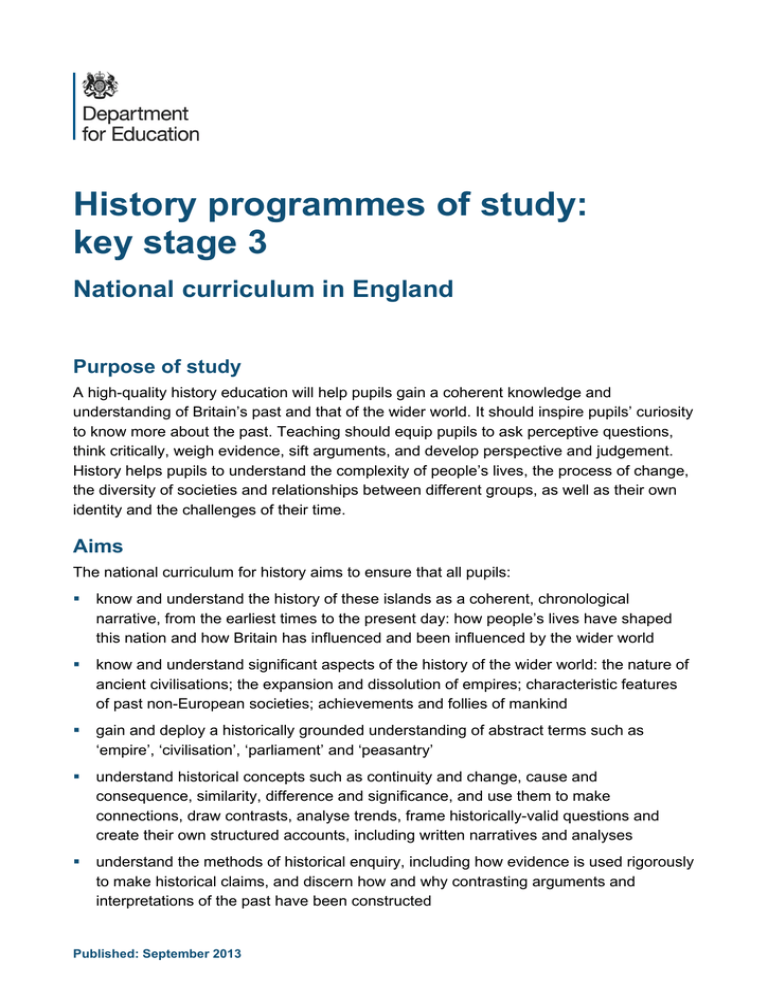
History programmes of study: key stage 3 National curriculum in England Purpose of study A high-quality history education will help pupils gain a coherent knowledge and understanding of Britain’s past and that of the wider world. It should inspire pupils’ curiosity to know more about the past. Teaching should equip pupils to ask perceptive questions, think critically, weigh evidence, sift arguments, and develop perspective and judgement. History helps pupils to understand the complexity of people’s lives, the process of change, the diversity of societies and relationships between different groups, as well as their own identity and the challenges of their time. Aims The national curriculum for history aims to ensure that all pupils: know and understand the history of these islands as a coherent, chronological narrative, from the earliest times to the present day: how people’s lives have shaped this nation and how Britain has influenced and been influenced by the wider world know and understand significant aspects of the history of the wider world: the nature of ancient civilisations; the expansion and dissolution of empires; characteristic features of past non-European societies; achievements and follies of mankind gain and deploy a historically grounded understanding of abstract terms such as ‘empire’, ‘civilisation’, ‘parliament’ and ‘peasantry’ understand historical concepts such as continuity and change, cause and consequence, similarity, difference and significance, and use them to make connections, draw contrasts, analyse trends, frame historically-valid questions and create their own structured accounts, including written narratives and analyses understand the methods of historical enquiry, including how evidence is used rigorously to make historical claims, and discern how and why contrasting arguments and interpretations of the past have been constructed Published: September 2013 History – key stage 3 gain historical perspective by placing their growing knowledge into different contexts, understanding the connections between local, regional, national and international history; between cultural, economic, military, political, religious and social history; and between short- and long-term timescales. Attainment targets By the end of key stage 3, pupils are expected to know, apply and understand the matters, skills and processes specified in the programme of study. Schools are not required by law to teach the example content in [square brackets] or the content indicated as being ‘non-statutory’. Subject content Key stage 3 Pupils should extend and deepen their chronologically secure knowledge and understanding of British, local and world history, so that it provides a well-informed context for wider learning. Pupils should identify significant events, make connections, draw contrasts, and analyse trends within periods and over long arcs of time. They should use historical terms and concepts in increasingly sophisticated ways. They should pursue historically valid enquiries including some they have framed themselves, and create relevant, structured and evidentially supported accounts in response. They should understand how different types of historical sources are used rigorously to make historical claims and discern how and why contrasting arguments and interpretations of the past have been constructed. In planning to ensure the progression described above through teaching the British, local and world history outlined below, teachers should combine overview and depth studies to help pupils understand both the long arc of development and the complexity of specific aspects of the content. Pupils should be taught about: the development of Church, state and society in Medieval Britain 1066-1509 Examples (non-statutory) This could include: 2 the Norman Conquest Christendom, the importance of religion and the Crusades the struggle between Church and crown Magna Carta and the emergence of Parliament the English campaigns to conquer Wales and Scotland up to 1314 History – key stage 3 Examples (non-statutory) society, economy and culture: for example, feudalism, religion in daily life (parishes, monasteries, abbeys), farming, trade and towns (especially the wool trade), art, architecture and literature the Black Death and its social and economic impact the Peasants’ Revolt the Hundred Years War the Wars of the Roses; Henry VII and attempts to restore stability the development of Church, state and society in Britain 1509-1745 Examples (non-statutory) This could include: Renaissance and Reformation in Europe the English Reformation and Counter Reformation (Henry VIII to Mary I) the Elizabethan religious settlement and conflict with Catholics (including Scotland, Spain and Ireland) the first colony in America and first contact with India the causes and events of the civil wars throughout Britain the Interregnum (including Cromwell in Ireland) the Restoration, ‘Glorious Revolution’ and power of Parliament the Act of Union of 1707, the Hanoverian succession and the Jacobite rebellions of 1715 and 1745 society, economy and culture across the period: for example, work and leisure in town and country, religion and superstition in daily life, theatre, art, music and literature 3 History – key stage 3 ideas, political power, industry and empire: Britain, 1745-1901 Examples (non-statutory) This could include: the Enlightenment in Europe and Britain, with links back to 17th-Century thinkers and scientists and the founding of the Royal Society Britain’s transatlantic slave trade: its effects and its eventual abolition the Seven Years War and The American War of Independence the French Revolutionary wars Britain as the first industrial nation – the impact on society party politics, extension of the franchise and social reform the development of the British Empire with a depth study (for example, of India) Ireland and Home Rule Darwin’s ‘On The Origin of Species’ challenges for Britain, Europe and the wider world 1901 to the present day In addition to studying the Holocaust, this could include: Examples (non-statutory) women’s suffrage the First World War and the Peace Settlement the inter-war years: the Great Depression and the rise of dictators the Second World War and the wartime leadership of Winston Churchill the creation of the Welfare State Indian independence and end of Empire social, cultural and technological change in post-war British society Britain’s place in the world since 1945 a local history study Examples (non-statutory) 4 a depth study linked to one of the British areas of study listed above a study over time, testing how far sites in their locality reflect aspects of national history (some sites may predate 1066) a study of an aspect or site in local history dating from a period before 1066 History – key stage 3 the study of an aspect or theme in British history that consolidates and extends pupils’ chronological knowledge from before 1066 Examples (non-statutory) the changing nature of political power in Britain, traced through selective case studies from the Iron Age to the present Britain’s changing landscape from the Iron Age to the present a study of an aspect of social history, such as the impact through time of the migration of people to, from and within the British Isles a study in depth into a significant turning point: for example, the Neolithic Revolution at least one study of a significant society or issue in world history and its interconnections with other world developments [for example, Mughal India 1526-1857; China’s Qing dynasty 1644-1911; Changing Russian empires c.1800-1989; USA in the 20th Century]. © Crown copyright 2013 You may re-use this information (excluding logos) free of charge in any format or medium, under the terms of the Open Government Licence. To view this licence, visit www.nationalarchives.gov.uk/doc/opengovernment-licence/ or email: psi@nationalarchives.gsi.gov.uk. Reference: DFE-00194-2013 5

